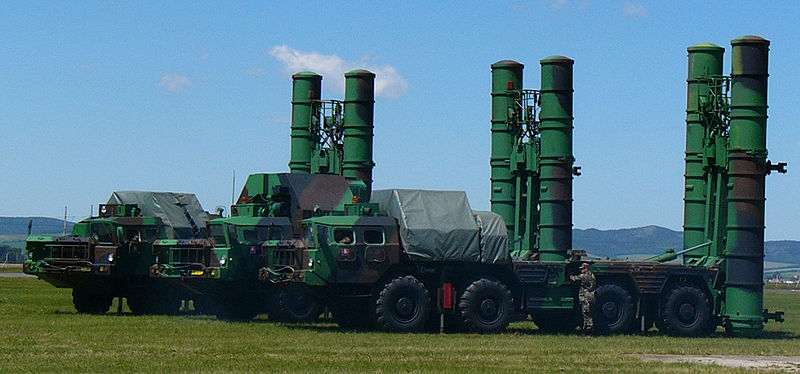(Photo: Wikipedia) (Reuters) – Israel could overcome advanced S-300 anti-aircraft missiles if they were deployed in Syriabut any strikes on the system would be difficult and risk alienating its supplier, Russia.
Israel has pledged to take preventive action, seeing a future Syrian S-300 as a “game-changing” threat to its own air space as well as to the relative free rein with which it now overflies its northern foe as well as neighboring Lebanon.
Experts agree that Israeli sabotage or open force to disrupt delivery byRussia is extremely unlikely – a view seemingly shored up by Syrian President Bashar al-Assad’s announcement on Thursday that the first missiles had arrived.
That leaves Israel lobbying Moscow to slow down the shipment in hopes it would be overtaken and scrapped if Assad fell to a more than two-year-old rebellion, and in parallel preparing counter-measures to neutralise the S-300 on the ground in Syria.
The Israeli newspaper Haaretz quoted National Security Adviser Yaakov Amidror as warning European diplomats that Israel would “prevent the S-300 missiles from becoming operational”. That may be achieved by ensuring Assad does not get the full system, experts say, or by disabling it militarily if he does.
“The S-300 would be the pinnacle of Russian-supplied arms for Syria,” Colonel Zvika Haimovich, a senior Israeli air force officer, told Reuters in an interview. “Though it would impinge on our operations, we are capable of overcoming it.
He said Israel’s “red line” on the S-300 was “between Syria and others”. This was a hint Israel might hold off on bombing the batteries as long they did not appear set on shooting down planes within Israeli airspace, of being transferred to Lebanese Hezbollah guerrillas or to Iran – both staunch allies of Assad and enemies of Israel, or of being looted by Islamist rebels.
MARKETING MOSCOW
The Israelis excel in electronic warfare. In 1982, they “blinded” Soviet-supplied Syrian anti-aircraft units in Lebanon, then destroyed 19 of them without Israeli losses. Similar technologies helped Israeli jets destroy a suspected nuclear reactor in Syria in 2007 and, this year, to hit Syrian targets on at least three occasions to prevent what intelligence sources called attempts to move advanced weaponry to Hezbollah.
A source close to Russia’s defence ministry agreed that the Israelis “likely have a million ways to combat the S-300 electronically”. But he questioned their feasibility because they had not been tested in war.
“So, whether the S-300 would fail or not cannot be known”.
Robert Hewson, an IHS Jane’s air power analyst, predicted Israeli prowess would prevail in Syria while cautioning that the S-300 would be the most formidable air defence system it had ever faced. “Israel has had nasty surprises from these things before,” he said, noting its steep losses to the Soviet anti-aircraft missiles used by Syria and Egypt in the 1973 war.
Hewson felt Israel would prefer to destroy the S-300 in Syria but may opt instead just to circumvent it as required for missions, especially if there was the risk of inadvertently killing or wounding Russians helping to install the system.
Security sources have put the number of Russian military personnel in Syria at several hundred.
“The Russians would react badly to losing their people, and Israel knows that equally,” Hewson said.
Former Israeli defence minister Moshe Arens said Moscow should be mindful of the harm that seeing the S-300 defeated in Syria would do to exports of the system elsewhere.
Past clients include Cyprus, whose S-300, posted on the Greek island of Crete, may have given Israel’s air force a chance for test runs during manoeuvres over the Mediterranean.
“I’d be very surprised if the Russians deliver this system (to Syria),” Arens told Israel Radio. “It would become apparent that our air force is capable of besting this system, and that would not make for good advertising.”
Playing down the strategic challenge that would be posed to Israel by a Syrian S-300, Arens added. “We are not afraid. This would simply change the situation, and we are not interested in the situation being changed to our detriment.”
Reuters has the full article










